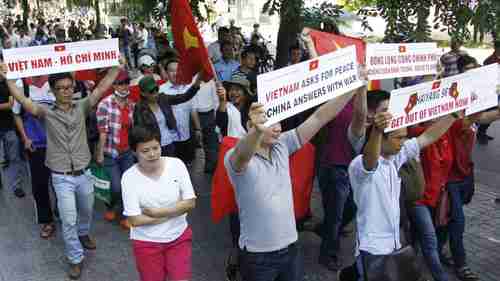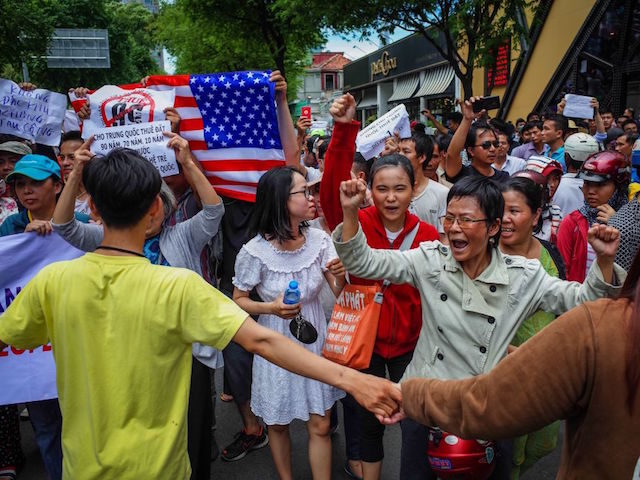This morning’s key headlines from GenerationalDynamics.com
- Vietnam government surprised by widespread anti-China and anti-government protests
- Anti-government protests grow in Vietnam along with anti-China protests
Vietnam government surprised by widespread anti-China and anti-government protests

Anti-China protests in Vietnam. ‘Haiyang 981’ is the name of the Chinese oil rig in Vietnam’s territorial waters (AP)
Protests erupted in cities across Vietnam on Sunday, triggered by a government proposed bill to implement new special economic zones (SEZs) that would allow land to be leased to foreign investors for a 99-year periods. Although the bill did not mention China, the protesters claimed that the bill would allow Chinese enclaves within Vietnam.
Tens of thousands of protesters occupied buildings in Hanoi, the capital city, and in Saigon (Ho Chi Minh city), with large rallies in other cities, including solidarity protests held abroad in Paris and Tokyo.
There is a growing animosity towards China in Vietnam because of China’s belligerent actions in the South China Sea. These actions include China’s deployment of an oil rig in Vietnam’s own territorial waters, in its exclusive economic zone (EEZ), and then China’s use of its vast military power to block Vietnam from exploring for oil in its own territorial waters.
China’s actions were declared illegal in 2016 by the United Nations Permanent Court of Arbitration in the Hague, which ruled that all of China’s activities in the South China Sea are illegal and in violation of international law. But China has ignored international law and has been doing what the Nazis did – using military force to annex regions belonging to other countries.
China deployed its oil rig in Vietnamese waters in 2014 and, beginning May 11 of that year, Vietnam erupted in anti-China protests, resulting in Chinese businesses and factories being attacked and damaged. The protests were fed by video in the Vietnamese media showing Chinese coast guard ships and Naval vessels attacking Vietnamese fishing vessels in Vietnam’s own territorial waters.
With China seizing Vietnamese areas in the South China Sea, the idea that China would have control of Vietnamese land as well has struck a nerve in many Vietnamese people, triggering the protests on Sunday.
The dictatorial Communist government of Vietnam is not normally responsive to public opinion but, in this case, were caught by surprise by how widespread the protests on Sunday were. If they had occurred only in Hanoi, the government would have controlled them, but the government was unprepared to try to control protests across the country.
The Communist government is reacting by demanding the social networking systems like Facebook, Twitter, and Google provide user identification to the government when demanded. This has provoked additional protests.
China’s government is warning Chinese citizens in Vietnam to take safety precautions. Vietnam Express and South China Morning Post (7-Jun) and Diplomat (12-May-2015) and Australian Broadcasting
Anti-government protests grow in Vietnam along with anti-China protests
As I described in 2014 in my Generational History of Vietnam, Vietnam has historically fought many wars against the Chinese. The most important was the Tay-Son rebellion, 1771-1790, the most celebrated military event in Vietnamese history. In its explosive climax in 1789, the Vietnamese troops repelled a much larger Chinese army in a brilliant battle that united the country for the first time.
Although the Tay-Son rebellion united the country at the time, Vietnam is basically two different countries, with two different ethnic origins, where North Vietnam (Vietnamese Kingdom) was originally populated by ethnic Chinese, while South Vietnam (Champa Kingdom) was populated by Polynesian settlers from Indonesia and Malaysia. These ethnic differences resulted in one ethnic crisis civil war after another, the most recent one being America’s “Vietnam War” that ended in 1974. From the point of view of Vietnam’s history, America was almost completely irrelevant in that war, as it was really a civil war between two different ethnic cultures.
Although Vietnam’s civil war ended in 1975, the enmity between the North and South Vietnamese has not disappeared. This was particularly apparent in 2006 when President George Bush visited Vietnam. As his limousine traveled through the streets of Saigon, the capital city of South Vietnam, young people lined the streets cheering wildly. Although the Communist government has renamed the city Ho Chi Minh city, many of the residents refuse to use that name and call it by its historic name, Saigon.
Sunday’s protests were not just anti-China; they were also anti-government protests demanding greater democracy. Some protesters carried banners reading “Returning Autonomy For [the] People.” Another placard stated the protest was against the National Assembly’s violation of the Constitution. The weekend protests may raise more awareness about land rights issues, especially the confiscation of land by the government. There’s also a general suspicion that the Communist government in Hanoi is making deals with China’s government in Beijing for its own benefit. Asia Times and Radio Free Asia and BBC (2-Jun)
Related Articles:
- China evacuates 3,000 citizens from Vietnam, fearing more violence (18-May-2014)
- South Vietnamese warmly welcome George Bush, goading the Communists in Hanoi (21-Nov-2006)
- Japanese warships visit Vietnam, as China moves warplanes into South China Sea (14-Apr-2016)
- Philippines humiliates China in harsh Hague Tribunal ruling over South China Sea (13-Jul-2016)
- As other Asian nations back down, India and Vietnam become allies confronting China (01-Sep-2017)
- Antiwar Democrats are freaking out over Bush’s Vietnam – Iraq war comparison. (24-Aug-2007)
KEYS:
Generational Dynamics, Vietnam, China, South China Sea, Haiyang 981, Hanoi, Saigon, Ho Chi Minh city, United Nations Permanent Court of Arbitration in the Hague, Tay-Son rebellion, Vietnamese Kingdom, Champa Kingdom, Indonesia, Malaysia
Permanent web link to this article
Receive daily World View columns by e-mail

COMMENTS
Please let us know if you're having issues with commenting.